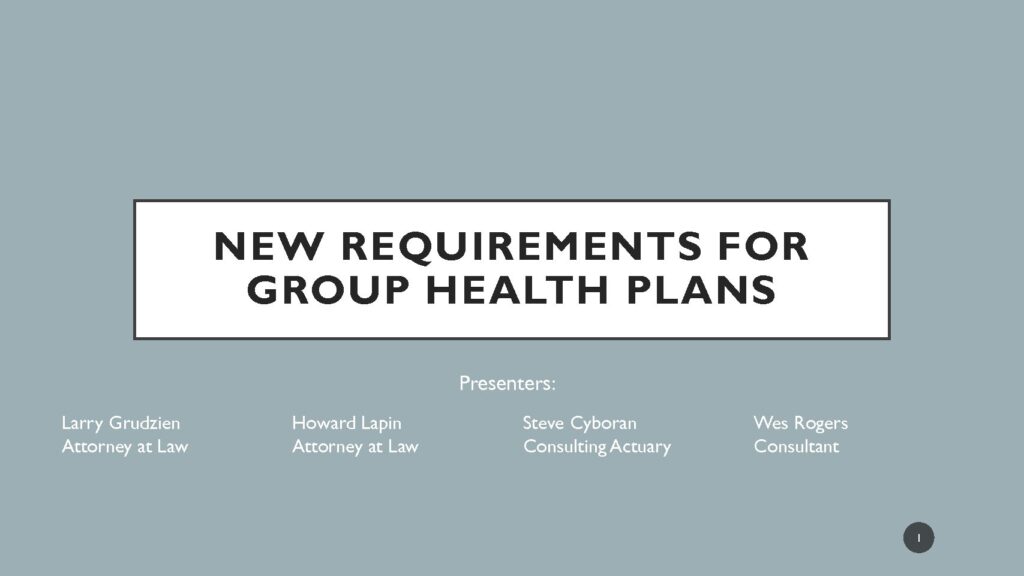Tag: #Rewards
Transparency Webinar Replay: Big Changes Coming! How to Comply with the Consolidated Appropriations Act (CAA) and Transparency in Coverage Rules!

A replay of and presentation deck for our July 20 Webinar is now available. This webinar addresses several new laws and regulations that significantly impact group health plans and individual insurance coverage. The Consolidated Appropriations Act (CAA), signed into law December 27, 2020, contained the No Surprises Act (NSA) and rules for the additional analysis required for Mental Health Parity (MHP). In addition, the Departments of Labor (DOL), Health and Human Services (HHS), and the Treasury (collectively, the Agencies) issued final “Transparency in Coverage” regulations requiring certain disclosures for group health plans and individual insurance.
Compliance Responsibility for Penalties
The following table summarizes the CAA, NSA, MHP, and Transparency in Coverage rules, including the responsible party, applicability, who will enforce the law or rules, and which party is subject to penalties. As of this date, there are still several uncertainties which we expect to be resolved as more guidance is made available by the DOL, HHS, and Treasury. We are working with the CMS oversight group to determine if, or how, these rules may, or may not, apply to self-funded student health plans.
| Insured Group Health | Self-Funded Group Health | Individual/Insured Student Health | Self-funded Student Health | |
| No Surprises Act | ||||
| Responsible Party | Uncertain | Employer | Uncertain | Uncertain |
| Applicability | Yes | Yes | Yes | Uncertain |
| Enforcement | State, then HHS | HHS, DOL, IRS | State, then HHS | Uncertain |
| Subject to Penalties | Uncertain | Employer | Uncertain | Uncertain |
| Transparency | ||||
| Responsible Party | Uncertain | Employer | Uncertain | Uncertain |
| Applicability | Yes, except Grandfathered Plans | Yes, except Grandfathered Plans | Yes | Uncertain |
| Enforcement | HHS, DOL, IRS | HHS, DOL, IRS | State, then HHS | Uncertain |
| Subject to Penalties | Uncertain | Employer | Uncertain | Uncertain |
| Mental Health Parity | ||||
| Responsible Party | Insurer | Employer | Insurer | MEC Plan Sponsor |
| Applicability | Yes | Yes | Yes | Maybe |
| Enforcement | State, then HHS | HHS, DOL, IRS | State, then HHS | State, perhaps |
| Subject to Penalties | Uncertain | Employer | Uncertain | Uncertain |
| Fee Disclosure | ||||
| Responsible Party | Service Provider1 | Service Provider1 | Insurer | Uncertain |
| Applicability | ERISA Plans | ERISA Plans | Yes | Uncertain |
| Enforcement | DOL | DOL | HHS | Uncertain |
| Subject to Penalties | Service Provider1 | Service Provider1 | Uncertain | Uncertain |
Why is transparency compliance important?
For group health plans, the penalty for non-compliance will be up to $100 per participant per day. For a group of 1,000 affected participants, the penalty could be about $36 million over the course of one year of non-compliance.
Available Support
We developed a Compliance Toolkit to facilitate self compliance, which is now available. Watch a replay of an overview webinar of the Compliance Toolkit. Our team of consultants, including actuaries, clinicians, behavioral health, pharmacy, and legal resources are also available to guide you through the compliance process, or we can take the lead. Please contact us.
Mental Health Transparency Implications
Mental health and substance abuse disorders (MH/SUD) are a big issue as a result of the COVID-19 response, economic shut down, and social isolation resulting from the transition to virtual work and education. As a result, we have seen significant increases in depression, where rates of depression tripled, substance abuse, and opioid use, in particular, where related deaths are were up 80% in 2020 to 90k, expanding on over 40 years of exponential increases in mortality.
With the passage of the CAA transparency rules, health plans are immediately required to conduct a detailed Comparative Analysis of both financial and non-financial treatment limitations if an Agency or plan participant requests the analysis, report, and supporting documentation. The Agencies are ramping up staff to focus on compliance.
In addition to complying with MHP, we also recommend developing a plan to mitigate the behavioral health issues in your organization. Compliance alone will not likely address the impact on your employees. An effective approach will require a more sustainable approach focusing on a purposeful culture, a healthy culture, and cultural alignment of all reward and benefit programs.
The webinar addresses these topics in much greater detail.
Free Webinar: New Transparency Rule/No Surprises Act

This webinar can now be accessed from Here.
Our Humaculture, Inc. approach to partnering with the best and brightest continues to grow and produce successes for our clients and partners alike.
As part of our continued efforts to bring to you the best resources, we want to make you aware of a free webinar on July 20, 2021 at 1:00 PM CDT.
Please register Here for the webinar.
The Consolidated Appropriations Act and the “Transparency in Coverage” regulations are potential game changers, affecting how health plans set prices for services, negotiate provider contracts and pay for out-of-network emergency care, report information and provide disclosures to participants.
These substantial new requirements will be effective for plan years beginning on or after 2022.
Steve Cyboran, Chief Behavioral Officer and Actuary, and Wes Rogers, Chief Guidance Officer, at Humaculture, Inc., will join attorneys Howard Lapin and Larry Grudzien to conduct a new free webinar reviewing the requirements for the Consolidated Appropriation Act and the “Transparency in Coverage” regulations on July 20 at 1 PM CDT.
The Webinar will be 90 minutes in length, and will cover a lot of detail and answer questions like:
Preventing Surprise Billing:
- What new requirements will be imposed to prevent surprise billing?
General Transparency:
- What new requirements must be added to insurer and TPA contracts to meet the new transparency requirements?
- What new EOBs must be provided to participants before any scheduled care?
- What new services must be provided to a “continuing care patient”?
- What new price comparison guidance must to be provided by phone or Plan website to participants?
- What new advanced explanation of benefits must be provided to participants if requested for scheduled services?
- What new provider directories must be provided and how often must they be updated?
- What new disclosures must be made to the plan for broker, TPA and other vendor fees?
Mental Health Parity Transparency:
- What detailed comparative analysis must be provide to governmental agencies if the plan provides both medical/surgical benefits and mental health/substance abuse benefits?
Reporting:
- What new reporting must be made to governmental agencies on drug prices?
Transparency in Coverage:
- What information must a health plan publicly report on negotiated in-network and out-of-network amounts?
- What information must health plans provide to participants on cost sharing?
We will also provide suggested steps to comply with these new reporting and disclosure requirements.
To mitigate technical issues, we are limiting the registration for this webinar to 500.
This Webinar will include a question and answer period.
A copy of the slides will be provided for all who register. After registering, you will receive a confirmation email containing information about joining the webinar.
If you have any comments or questions regarding any of the above information, please do not hesitate to contact us.

